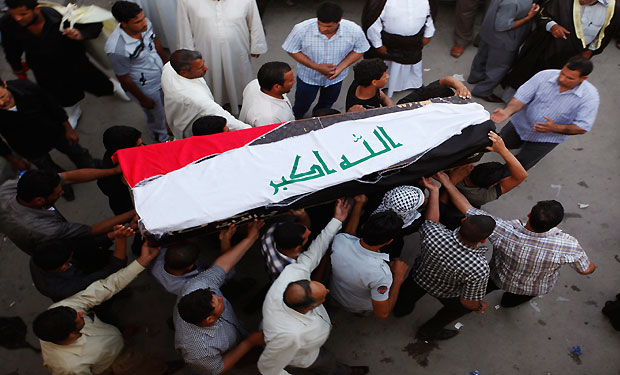
Relatives carry the coffin of an Iraqi soldier killed by militants during a funeral in Najaf, 160 km (100 miles) south of Baghdad, April 28, 2013. (Reuters/Haider Ala)
Baghdad, Asharq Al-Awsat—Iraqi authorities announced that gunmen killed at least 14 travelers at a fake checkpoint at a remote desert site in Al-Anbar province on Wednesday in what appears to be an escalation of the sectarian violence gripping the country.
The attack in Nukhaib reportedly targeted Shi’ite pilgrims; the City Council of the Shi’ite holy city of Karbala accused Sunni insurgents and the outlawed Ba’athist party of responsibility. This attack took place as proposed talks between Anbar tribal sheikhs and the Baghdad government, scheduled to begin last week, remain stalled. Iraq remains in the grip of predominantly Sunni-led anti-government protests focused particularly in the Anbar province; the protests and general lack of security has given rise to escalating sectarian unrest in the country.
The Anbar tribal council held a meeting last week, attended by Anbar governor Mohamed Qasim Fahdawi, to discuss resolving the security crisis in Iraq’s western provinces. The Anbar protest leadership are reportedly frustrated with the Nuri Al-Maliki government’s reluctance to hold talks to end the crisis.
Speaking to Asharq Al-Awsat earlier this week, Sheikh Hamid Al-Shuka emphasized that “the tribal delegation has been ready to go to Baghdad [for talks] for weeks, after we received positive signals from the government regarding starting negotiations to put an end to the sit-ins and demonstrations.”
He revealed that this Anbar delegation is comprised of “pillars” of the Anbar tribal community who are seeking to act as mediators between the government and the protesters.
“The demonstrators, regardless of their [political] orientation or conviction, are the sons of this province. Therefore, our responsibilities as tribal leaders require us to act, especially as we do not have interests and objectives.”
As for whether the government is serious about negotiating with the protesters, Shuka said: “Our priority is to serve the interests of our province and ensure the rights of the demonstrators.”
“It has always been the responsibility of the tribal sheikhs to intercede and resolve conflict,” he added.
Shuka also played down the role that Anbar Governor Mohamed Qasim Fahdawi will play in any negotiations, particularly as this is something rejected by a majority of the protesters who fear he will attempt to use this to make political gains.
“The governor of Anbar…only attended the tribal meeting as a spectator and did not participate in the debate,” he said.
Mohammed Fathi, a spokesman for the Anbar governor’s office, informed Asharq Al-Awsat, that “the actions being taken by the Anbar governor and tribal leaders does not represent negotiations on behalf of the protesters…this represents interceding between the protesters and the government.”
The senior-most United Nations official in Iraq condemned “in the strongest terms” the killing of at least 14 people in Anbar, describing this as a “heinous, cold-blooded murder.”
“I urge the security authorities to take swift and decisive action to arrest the perpetrators of this abominable crime and bring them to justice,” Martin Kobler, the Special Representative of the UN Secretary-General, said in a statement release by the UN Assistance Mission for Iraq (UNAMI).
The UNAMI head noted that this attack follows one of the most deadliest month in recent years in Iraq. A total of 1,045 Iraqis were killed and another 2,397 wounded in acts of terrorism and violence in May.
